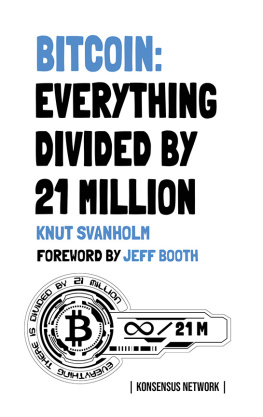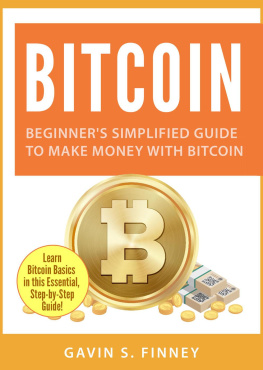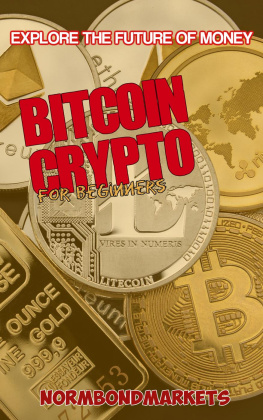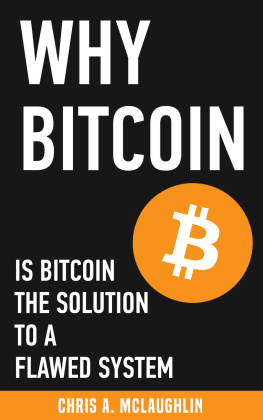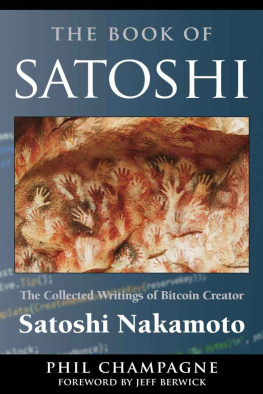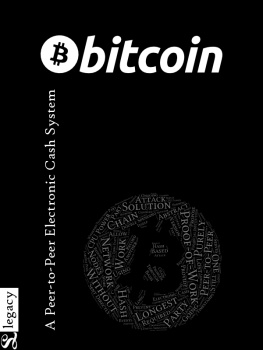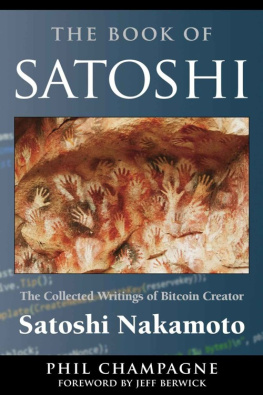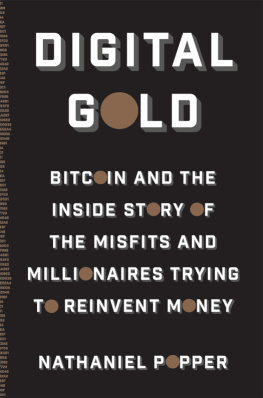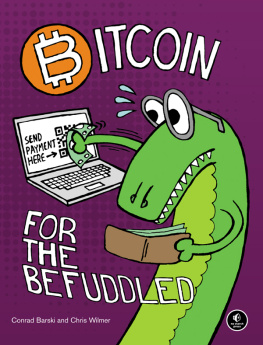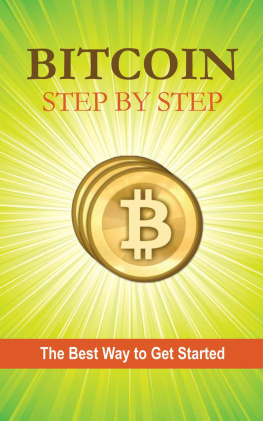Bitcoin: Everything divided by 21 million
Edited by Jeff Booth, Mel Shilling and Niko Laamanen
All rights reserved
Edited by Jeff Booth, Mel Shilling and Niko Laamanen
Infinity key art by @FractalEncrypt
Cover design and typesetting by Niko Laamanen
Bitcoin: Everything divided by 21 million
FOREWORD
Everything is first an idea, competing for our attention, actions, and time. A random idea to meet someone I had only known through Twitter, Knut Svanholm, turned into the most incredible evening of dinner, drinks, and playing guitar with our families in Southern Spain. An instant and deep connection was formed. These interactions change us, often without our realization. Wherever it goes, I suspect it was only the start of a long friendship that all started with an idea.
We are idea machines. Good ideas, mediocre ideas, bad ideas our entire world is made up of them. A matrix of thoughts governs how we interact with others, our economy, and our system(s) of governance. The chair youre sitting in competed against all other ideas, chair formats, and companies creating chairs to win your attention and purchase. Similar to the car you drive or the smartphone you use. Free speech is an idea. So is communism. We become so wed to our ideas that we often become defined by them. Because of this, they are powerful in uniting us, dividing us or in controlling us. It is our choice which ideas are right to us, and life reflects those choices.
Individually, our thoughts and actions form our own reality, and collectively they roll up and form our shared reality. From our narrow view of what we consider an accurate representation of the world, we fail to see that others live in a completely different reality that they also deem accurate. We can easily see in others where their ideas may be holding them back, but we completely fail to see the same thing in ourselves. We are so sure in our ideas that well fight to protect them, replacing reasoning and logic with emotion to prove our point, which allows us to be easily fooled. In our attempt to defend our ideas at one level, we miss natural incongruences at the foundational level that might be driving them. One example is simultaneously believing in free markets while advocating for Central Bankers to provide liquidity to protect asset prices or the stock market. We have a hard time connecting the dots and seeing the cognitive dissonance.
We cannot predict when a new idea or truth shatters our previous set of beliefs and replaces them with something that works better. Well fight something for years, only to change our minds entirely in an instant. Once we see it, we cant unsee it. Worse still, from our new enlightenment, we might ridicule others who cant see the new truth. The process takes time, often generations, to weave throughout the world. I often imagine what society felt like to Galileo. When looking at the night sky, he realized that the Earth rotated around the Sun, but it was considered absurd and heretical to the Catholic Church and teaching.
Regardless of the time, these ideas are humanitys individual and collective force and consciousness. Competing to find better ways, they improve the human experience as a result. You could consider these ideas learning. Our intelligence as a species always has been, and is today, fundamentally a collective growth of information-driven from this competition of ideas.
Chaotic, messy, disorderly. New ideas must compete with previously held beliefs that have hardened in our minds. We let our grasp of them go one finger at a time, and because we make predictions from our current reality, its hard for us to imagine how one small change might cascade to others. So, when an idea challenges a previously held belief, there is a high probability that we will either ignore it or fight it instead of investigating it for its merits.
In economics, that process describes Creative Destruction , a paradoxical term first coined by Joseph Schumpeter in 1942 to describe how Capitalism works in a free market. Entrepreneurs innovate and create value for society and that value gained by society also often "destroys" the former monopoly power or "idea." The former monopoly typically either ignores or fights the new idea. That process and its importance are at the center of how modern economies have evolved and given rise to most of the benefits to the society we take for granted today. New winners become so valuable that they disrupt existing market power or structures. Driven from a near-constant flow of innovative entrepreneurs with bold ideas and the capital backing them that challenge the status quo and are only successful, "if" they create value for society (us).
For the process to work, failure is critical! Both for entrepreneurs and the capital in them whose business doesnt work, and for legacy businesses that get disrupted by them, if their innovation brings better value to society. And while failure is difficult, preventing it is far worse because it disrupts the delicate balance of the free market. What starts a seemingly small intervention eventually becomes encoded into a distorted form of Capitalism, cascading to ever-escalating intervention and control to protect the overall market from collapsing. False stability is replaced with growing instability as true market signals evaporate and social constructs decay. Along this path, it is not only the free market that is lost.
Remember, the free market is made up of these ideas. They are us. The sum of our thoughts and actions trying to stand out from other ideas, with an intention to deliver value to others. They form the economy because we choose these new ideas, or we do not, depending on the value they provide to us. We can choose to limit ideas, suppress them, destroy them in the name of control, but as we do, we in turn, limit our own potential.
At a higher level of abstraction than the free market, these actions also form the system by which we govern: to allow the proliferation of ideas to emerge. When we reach into free markets to control them, we distort them. In the short term, with a backdrop of competition for jobs, growth, protection of markets, these decisions usually win accolades from the public and ensure votes. They are popular, but at their core, they lead to some people, industries, or countries winning unfairly at the expense of others. This could be by favoring one company over another domestically or in nations protecting their vital industries from competition. It doesnt matter. Market protection spreads and intensifies as it robs the free market of both labor and capital. Malinvestments rise. Structurally, those choices must lead away from our choices and towards an ever-increasing consolidation of power. While that might look like wilful neglect or bad intent, the primary driver is just a system with reinforcing negative feedback loops attempting to protect the status quo and save the system which would otherwise fail. Greater centralization of control to attempt to stave off the inevitable collapse intrudes further on the free market. As market participants understand how the game is played, more race in for their share of the action. As the distortions escalate, people literally vote away their individual rights and freedoms in favor of protection by the state and centralization. They are fully convinced that the free market is to blame for the rising inequality, division, and societal chaos even though these are predictable consequences of abandoning it.
This is why bitcoin is such an important idea. History proves that if money can be controlled to give an advantage to some over others, it will be. By removing that ability, bitcoin provides a network transfer from a system unable to fix itself, to a system that can. A bridge from a system on a path to a dystopian future to a future of hope.
As the network emerges, the more people who use it and build to it, it continues to increase its value to everyone else, accelerating adoption. Sure, those early in bitcoin hold more of the wealth, as it should be in a free market where they out-predicted others, but importantly, they dont hold more power. In time, the only way to accumulate more bitcoin is by providing value to others, measured by them, in a free market. Coercion is replaced by cooperation as people come to realize that control of others through a monetary network like bitcoin requires paying them in bitcoin and therefore losing control.
Next page
